Why Heat Pumps Have Overtaken Conventional AC in Metro Denver
Changing code and other factors have certainly had their impact over the years on the products that our team at Save Home Heat Company installs for homeowners around the Denver Metro, Boulder, and Loveland area. Most notable currently is the growth of heat pumps in both central and mini-split heating and cooling applications. Heat pumps are now also available in certain models of water heaters, and very recently they started appearing in some hot water boiler designs, too.
In this post, our comfort team at Save Home Heat will focus on the shift we’re seeing in consumer choices, in favor of heat pumps over conventional air conditioners.
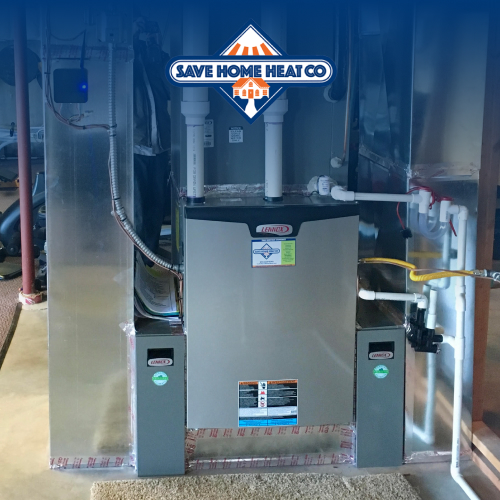
The Difference Between a Heat Pump and an Air Conditioner
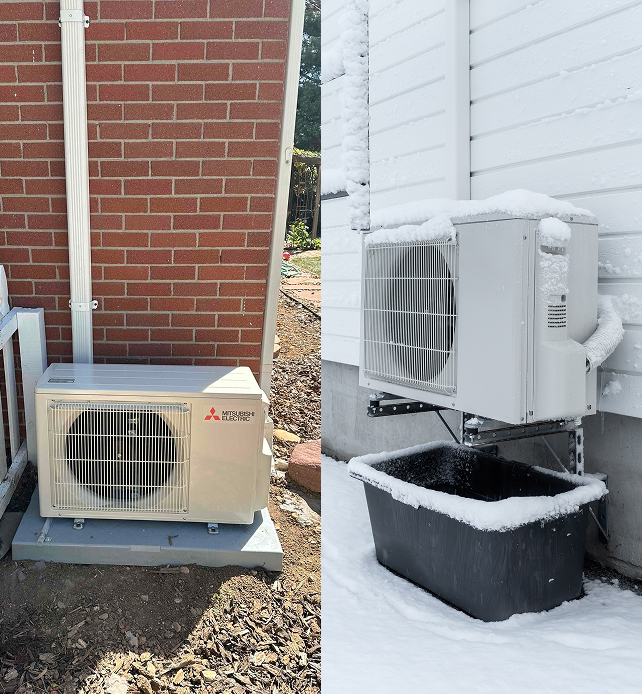 In brief review, the key difference between a heat pump and an air conditioner is that a heat pump provides both heating and cooling, while an air conditioner is strictly a cooling product. In many other respects, the two products are very similar: for starters, both are sealed comfort systems that are charged with refrigerant, and both have an outdoor condensing unit and an indoor component.
In brief review, the key difference between a heat pump and an air conditioner is that a heat pump provides both heating and cooling, while an air conditioner is strictly a cooling product. In many other respects, the two products are very similar: for starters, both are sealed comfort systems that are charged with refrigerant, and both have an outdoor condensing unit and an indoor component.
Many people find it convenient to think of a heat pump as an AC system that can also operate in reverse during the winter. During the summer, for cooling, the refrigerant in a heat pump system flows in one direction, while during the heating season, it flows in the opposite direction. A simplistic explanation, of course, but this is the most important distinction between AC and a heat pump.
The Heat Pump Trend That We’re Seeing
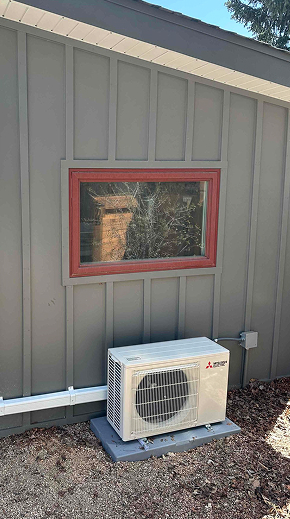 Over the past couple of years, heat pump sales to our customers have overtaken conventional air conditioners by a significant margin. In fact, heat pumps are by far the most popular cooling system that our team currently installs. This includes single-zone and multi-zone mini-split heat pumps, as well as central heat pumps primarily used in a dual fuel application with a gas-fired forced air furnace. In dual fuel installations, it’s fairly common that the existing gas furnace is upgraded at the same time – but that depends on the age, efficiency, and condition of the existing furnace.
Over the past couple of years, heat pump sales to our customers have overtaken conventional air conditioners by a significant margin. In fact, heat pumps are by far the most popular cooling system that our team currently installs. This includes single-zone and multi-zone mini-split heat pumps, as well as central heat pumps primarily used in a dual fuel application with a gas-fired forced air furnace. In dual fuel installations, it’s fairly common that the existing gas furnace is upgraded at the same time – but that depends on the age, efficiency, and condition of the existing furnace.
Our team estimates that approximately 80% to 90% of the cooling systems that our team currently installs are mini-split or central heat pumps, with central AC being most prevalent among the 10% to 20% of the cooling-only products that we install.
Why the Shift To Heat Pumps?
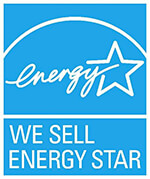 The primary reason for the shift away from conventional AC toward heat pumps is the availability of significant rebates and other financial incentives from a variety of sources – which, in most cases, currently makes a heat pump a less expensive proposition than a cooling-only system. For many years, this wasn’t the case. For example, in May of 2025 it’s not unusual for our team at Save Home Heat to be able to offer combined utility company and manufacturer rebates exceeding $10,000 for a variety of qualifying heat pump installations. In some cases, the Xcel Energy rebate, alone, can exceed $10,000.
The primary reason for the shift away from conventional AC toward heat pumps is the availability of significant rebates and other financial incentives from a variety of sources – which, in most cases, currently makes a heat pump a less expensive proposition than a cooling-only system. For many years, this wasn’t the case. For example, in May of 2025 it’s not unusual for our team at Save Home Heat to be able to offer combined utility company and manufacturer rebates exceeding $10,000 for a variety of qualifying heat pump installations. In some cases, the Xcel Energy rebate, alone, can exceed $10,000.
In addition, the reduced carbon footprint that an electrically efficient heat pump provides is a great bonus for environmentally conscious homeowners who are looking for “green” home comfort alternatives. Heat pumps are also well aligned with changing federal, state, and local mechanical code.
On top of all that, the year-round comfort that heat pumps provide give them yet another leg up on conventional air conditioners.
Other factors that contribute to the ‘heat pump movement’ include:
- In a dual fuel installation (working in tandem with a gas furnace), a central heat pump provides an alternate means for heating the home in the event that the furnace (or other primary heating system) stops working
- Also in dual fuel central installations, the heat pump assumes part of the home’s heating load, reducing the load, stress, and wear and tear on the furnace. This can help reduce the likelihood of unforeseen parts failures and also help extend the life of the furnace
- In many cases, heat pumps provide higher SEER efficiency ratings for cooling, as compared with otherwise equivalent AC-only systems
- Heat pump technology has come a long way since the days when we routinely replaced heat pumps and other electric heating systems with gas furnaces and boilers in many Boulder/Denver area neighborhoods. At the time, the trend was due to the high costs associated with operating electric heating products, combined with relatively affordable natural gas becoming more available in many areas. Added to this was the growth of high efficiency gas furnace and boiler designs. Times have changed, again
Of note, multi-zone mini-split heat pump systems are especially popular with our customers because of the benefits of zoned heating and cooling that they provide.
Heat Pump Rebates and Credits May Be Available!
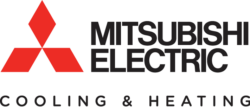 When providing a free heating or cooling installation quote, our comfort advisers frequently discuss rebates and other financial incentives that may be available – heat pumps are not alone in most rebate programs, but they certainly reap some of the largest returns. In the case of rebates offered from our primary Denver area utility, Xcel Energy, or manufacturers like Lennox Industries, our team at Save Home Heat handles all the paperwork and tracking for our customers.
When providing a free heating or cooling installation quote, our comfort advisers frequently discuss rebates and other financial incentives that may be available – heat pumps are not alone in most rebate programs, but they certainly reap some of the largest returns. In the case of rebates offered from our primary Denver area utility, Xcel Energy, or manufacturers like Lennox Industries, our team at Save Home Heat handles all the paperwork and tracking for our customers.
When it comes to federal and State of Colorado rebates and incentives for qualifying heat pump installations, we recommend talking with your tax advisor first and then enlisting our team to help connect the dots. We feel it’s a good idea to get all those ducks in a row before you spend any money!
Please note: There may also be financial incentives available for qualifying heat pump water heater installations, too!
More on Xcel ‘triple heat pump rebates’
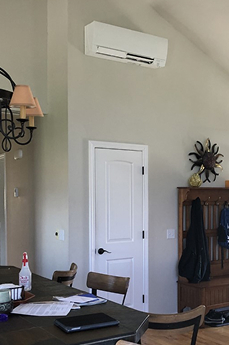 Xcel Energy currently offers the highest heat pump rebates we’ve ever seen. Our understanding is that that these enhanced rebates are available for a limited time in 2025, while funding lasts. We’re not sure if they’ll still be available, come fall. As the program currently stands, what Xcel defines as a qualifying “Cold Climate” rated central or mini-split heat pump can earn a rebate of up to $11,250, depending on the size of the system. Certain models of “Standard” level heat pumps also qualify for generous Xcel rebates.
Xcel Energy currently offers the highest heat pump rebates we’ve ever seen. Our understanding is that that these enhanced rebates are available for a limited time in 2025, while funding lasts. We’re not sure if they’ll still be available, come fall. As the program currently stands, what Xcel defines as a qualifying “Cold Climate” rated central or mini-split heat pump can earn a rebate of up to $11,250, depending on the size of the system. Certain models of “Standard” level heat pumps also qualify for generous Xcel rebates.
In addition, Xcel currently offers a $2,250 heat pump water heater rebate for qualifying units during their ‘triple rebate’ period this year.
Our team at Save Home Heat Company is a certified installer for Xcel’s rebate program, which is required in order to offer their heating and cooling rebates.
Lennox rebates

Lennox Industries frequently (but not always) offers seasonal national promotions throughout the year, featuring package system rebates, along with rebates on individual equipment purchases. In spring of 2025, package rebates from Lennox range as high as $2,000, and heat pumps are a key component in this program.
As with Xcel heating and cooling rebates, our team handles all Lennox rebate submittals and tracking for our customers!
State & federal financial incentives
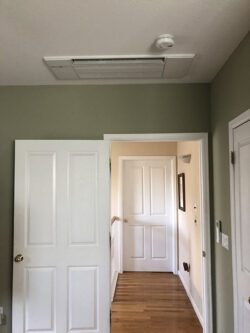 DISCLAIMER: The information in this section was compiled from what appear to be reliable online sources, and is provided for general information purposes only. This information is not to be construed as professional financial advice. In order to verify the availability of state and federal energy efficiency and heat pump incentives, and their amounts and requirements, we strongly recommend consulting a financial professional who is familiar with the complete landscape of state and federal incentives – and who can assist you in finding local programs that may also be of value to you. We routinely assist our customers with connecting the dots on the product and installation side of things.
DISCLAIMER: The information in this section was compiled from what appear to be reliable online sources, and is provided for general information purposes only. This information is not to be construed as professional financial advice. In order to verify the availability of state and federal energy efficiency and heat pump incentives, and their amounts and requirements, we strongly recommend consulting a financial professional who is familiar with the complete landscape of state and federal incentives – and who can assist you in finding local programs that may also be of value to you. We routinely assist our customers with connecting the dots on the product and installation side of things.
State of Colorado and local heat pump incentives
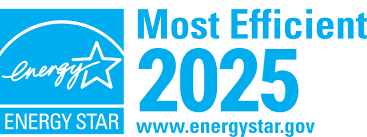 The State of Colorado offers a direct state tax credit of 10% on qualifying heat pump purchases, not including installation cost. As far as heat pump incentives on a more local level, here’s a partial list of cities in the Denver area that appear to currently have local programs in place; wherever you live in the Metro area, we recommend reaching out to your local municipality to confirm if there’s a program you can take advantage of:
The State of Colorado offers a direct state tax credit of 10% on qualifying heat pump purchases, not including installation cost. As far as heat pump incentives on a more local level, here’s a partial list of cities in the Denver area that appear to currently have local programs in place; wherever you live in the Metro area, we recommend reaching out to your local municipality to confirm if there’s a program you can take advantage of:
- City of Denver heat pump rebates
- Denver’s Healthy HOMES and Climate Action programs
- Boulder County EnergySmart program (including cities and towns such as Louisville, Superior, Lafayette, and Erie, as well as the city of Boulder)
- City of Boulder residential rebates
- City of Longmont rebates (through the Efficiency Works program)
- City of Loveland rebates (through the Efficiency Works program)
Federal heat pump incentives
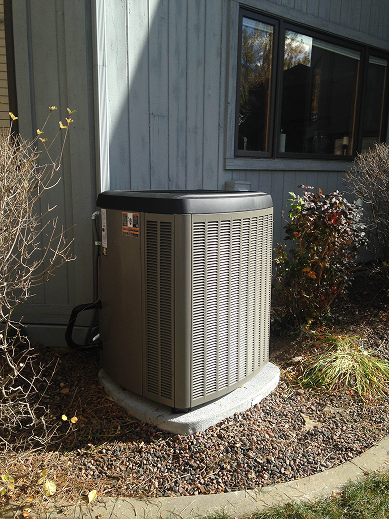
On the federal level, there are currently a number of incentives available for homeowners upgrading to qualifying heat pump systems. The Federal Energy Efficient Home Improvement Credit offers up to 30% of the cost of a qualifying heat pump system, including installation, with a maximum credit of $2,000.
Another potential national incentive comes from the Home Electrification and Appliance Rebates (HEAR) program, which provides significant rebates to Colorado residents who meet low-to-moderate income qualifications. Among other products, this program includes eligible heat pumps, as well as heat pump water heaters.
Lastly – and NOT a product that resides under our umbrella at Save Home Heat – is the Federal Residential Clean Energy Credit, which covers geothermal (ground-source) heat pumps. We’ve included it in this overview for the sake of completeness.
The Big Question: Should You Buy a Heat Pump or an Air Conditioner?
Along with other factors that we discussed above, your total out-of-pocket investment, after rebates and other incentives, naturally plays a big part in helping you decide what comfort product makes sense for you: The lower cost often wins out. Given the current financial incentives, in most cases heat pumps are now getting the nod over conventional AC systems, simply due to cost.
Add to cost considerations the ability to reduce your home’s carbon footprint, and once again, a heat pump may be the system you feel most comfortable with – regardless of price. And then there’s the added versatility and efficiency that heat pumps bring to the table.
So our answer to the above “$100,000 Question” for homeowners in our area is, “In most cases, a heat pump probably makes more sense to purchase than an air conditioner.”
What about conventional AC systems?
This doesn’t mean that conventional air conditioners will no longer available – we still sell plenty, as circumstances dictate – but the writing on the wall is clear that heat pumps have recently carved a larger niche as the most popular cooling option for homeowners in metro Denver and beyond.
Heating & Cooling in Denver, Boulder, and Loveland
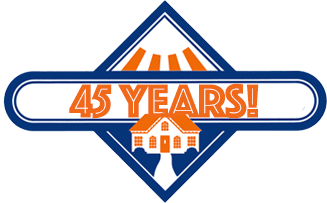 So, it’s easy to see why central and mini-split heat pumps have become the go-to cooling choice for most homeowners in our area in 2025. Serving Metro Denver, Boulder, Loveland, and surrounding communities, our friendly team at Save Home Heat Company is here to help you find the right cooling and heating fit for your particular home and your specific needs.
So, it’s easy to see why central and mini-split heat pumps have become the go-to cooling choice for most homeowners in our area in 2025. Serving Metro Denver, Boulder, Loveland, and surrounding communities, our friendly team at Save Home Heat Company is here to help you find the right cooling and heating fit for your particular home and your specific needs.
Our philosophy at Save Home Heat is simple: We listen carefully to our customers and prioritize meeting their specific goals when we present options that we feel make sense to consider. Along with price, comfort and efficiency are often a big part of the equation. Please give us a call today to receive a highly informative, zero pressure, free installation quote from one of our experienced, knowledgeable comfort advisors!
Please contact me to schedule a heating & cooling upgrade quote!


